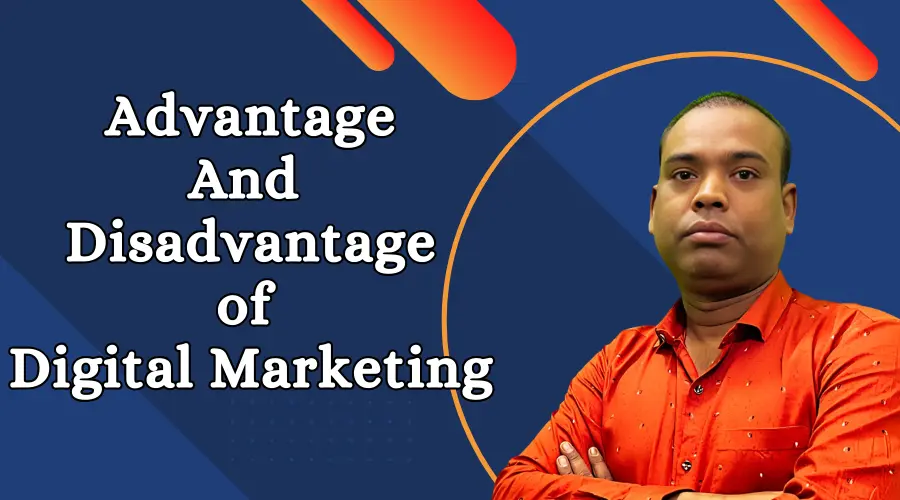Digital marketing has revolutionized how businesses reach their target audiences, replacing traditional methods with a dynamic, data-driven approach. With the rapid advancement of technology and the growing prominence of online platforms, digital marketing has become indispensable for businesses of all sizes.
However, like any strategy, digital marketing has its strengths and limitations. This article dives deep into the advantages and disadvantages of digital marketing, offering a balanced perspective for businesses and marketers.
What is Digital Marketing?
Digital marketing refers to promoting products or services using digital channels such as websites, social media platforms, search engines, email, and mobile apps. It encompasses strategies like Search Engine Optimization (SEO), Pay-Per-Click (PPC) advertising, content marketing, and social media marketing, among others.
Advantages of Digital Marketing
- Wider ReachDigital marketing allows businesses to reach a global audience, breaking geographical barriers. Through platforms like Google and Facebook, even small businesses can target customers worldwide.
- Cost-EffectiveCompared to traditional marketing methods such as TV or print ads, digital marketing is more affordable. Platforms like social media ads and email campaigns enable businesses to achieve results with limited budgets.
- Measurable ResultsTools like Google Analytics, SEMrush, and HubSpot provide real-time insights into campaign performance. Businesses can track metrics like website traffic, click-through rates, and conversion rates, enabling data-driven decision-making.
- Targeted AdvertisingDigital marketing enables precise audience targeting based on demographics, interests, location, and behavior. This ensures that the right message reaches the right people at the right time.
- Improved EngagementPlatforms like Instagram, LinkedIn, and YouTube allow businesses to interact with their audience through comments, likes, and shares, fostering stronger customer relationships.
- Flexibility and ScalabilityCampaigns can be adjusted in real-time based on performance metrics. This flexibility allows businesses to scale their efforts up or down, depending on their goals.
- PersonalizationWith tools like email automation and CRM systems, businesses can deliver personalized messages tailored to individual customer preferences, increasing engagement and loyalty.
- Enhanced Brand AwarenessThrough consistent online presence and targeted campaigns, digital marketing helps businesses build brand recognition and trust among their target audience.
- 24/7 MarketingDigital marketing works round the clock, enabling businesses to attract customers even outside business hours. Automated tools ensure campaigns run seamlessly.
- Eco-Friendly OptionDigital marketing reduces reliance on physical materials like brochures and flyers, making it an environmentally friendly alternative.
Disadvantages of Digital Marketing
- High CompetitionThe digital space is crowded, making it challenging for small businesses to stand out against competitors with larger budgets.
- Dependence on TechnologyDigital marketing heavily relies on technology. Issues like server downtime, website crashes, or software glitches can disrupt campaigns.
- Constantly Changing LandscapeAlgorithms on platforms like Google and Facebook frequently change, requiring marketers to stay updated and adapt their strategies continuously.
- Privacy ConcernsCollecting and using customer data for targeted advertising raises concerns about data privacy and security. Adhering to regulations like GDPR is essential but can be complex.
- Time-ConsumingPlanning, executing, and monitoring digital campaigns require significant time and effort. Small businesses with limited resources may struggle to manage these activities effectively.
- Skill DependencyEffective digital marketing requires expertise in areas like SEO, PPC, content creation, and analytics. Hiring skilled professionals or training existing staff adds to operational costs.
- Risk of Negative FeedbackSocial media platforms provide customers with a space to voice complaints or negative reviews, which can harm a brand's reputation if not managed properly.
- Short-Term FocusSome digital marketing tactics, like PPC ads, may yield quick results but are not sustainable in the long term without continuous investment.
- Over-Saturation of AdsWith a surge in online ads, consumers often feel overwhelmed and resort to ad-blocking tools, reducing the effectiveness of campaigns.
- Ethical ChallengesAggressive marketing tactics, like misleading clickbait or over-targeting, can damage a brand's reputation and erode consumer trust.
Key Strategies to Overcome Disadvantages
- Focus on Quality ContentInvest in high-quality, valuable content that addresses audience needs, helping businesses stand out amidst competition.
- Adopt a Multi-Channel ApproachDiversify marketing efforts across various channels like social media, email, and search engines to reduce dependency on a single platform.
- Stay UpdatedRegularly update knowledge about digital marketing trends, tools, and regulations to remain competitive.
- Enhance Customer EngagementRespond promptly to customer queries and feedback on social media platforms to build trust and loyalty.
- Leverage AutomationUtilize marketing automation tools to save time and improve campaign efficiency.
Conclusion
Digital marketing is a powerful tool that has transformed how businesses engage with their audiences. While it offers numerous advantages like cost-effectiveness, global reach, and real-time insights, it also comes with challenges such as high competition and technological dependence.
By understanding its pros and cons and adopting a strategic approach, businesses can maximize the benefits of digital marketing while mitigating its drawbacks. With continuous learning and adaptation, digital marketing remains an essential avenue for businesses aiming for growth and success in the digital age.
